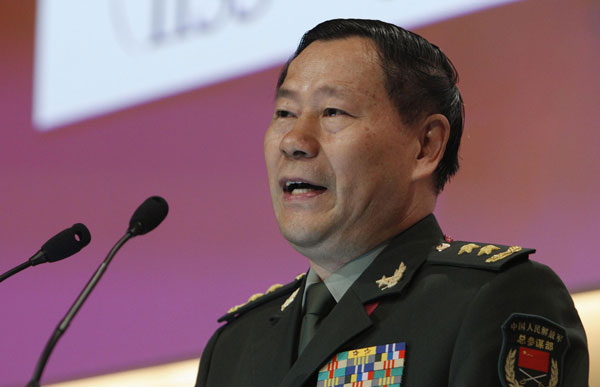China commits to win-win development
Updated: 2013-06-02 13:55
(Xinhua)
|
||||||||
SINGAPORE - China's hope for sustained peace and stability in this region and stress on dialogues and consultations for the sake of peace by no means denotes unconditional compromise, said Qi Jianguo, deputy chief of general staff of the People's Liberation Army (PLA) of China.
"Our resolve and commitment to safeguarding core national interests always stands steadfast," Qi said in a speech at the 12th Shangri-La Dialogue, a multilateral forum organized by the London-based think tank International Institute for Strategic Studies.
 |
|
China's People's Liberation Army (PLA) Deputy Chief of General Staff Qi Jianguo, speaks during the 12th Shangri-La Dialogue, in Singapore, June 2, 2013. [Photo/Agencies] |
Qi said China upholds an open spirit of not only taking strides towards the world, but also welcoming the world to engage China, with the purpose of sharing resources and jointly creating a better future.
"For this end, we should discard cold-war mentality, go beyond the outdated zero-sum games, and refrain from building military alliances, setting imaginary enemies and taking actions against a third party," he said.
To realize prosperity, stability and development of Asia-Pacific region, one cannot merely rely on the efforts of a single nation, nor on expansion and plundering, even less on the obsession with use of force - the only way forward is to take cooperation as the overriding principle, Qi noted.
"We believe that win-win development entails sharing of interests, one should take the legitimate concerns of others' into consideration instead of only maximizing one's own interests," Qi said.
He stressed that countries, no matter big or small, are all equal, and they should respect each other and build win-win relationships.
The 12th Shangri-la Dialogue, which opened on May 31, gathered defense ministers, vice-ministers, senior military officials and scholars from over 20 Asia-Pacific countries and regions, as well as countries in North America, Europe and the Middle East.

 Michelle lays roses at site along Berlin Wall
Michelle lays roses at site along Berlin Wall
 Historic space lecture in Tiangong-1 commences
Historic space lecture in Tiangong-1 commences
 'Sopranos' Star James Gandolfini dead at 51
'Sopranos' Star James Gandolfini dead at 51
 UN: Number of refugees hits 18-year high
UN: Number of refugees hits 18-year high
 Slide: Jet exercises from aircraft carrier
Slide: Jet exercises from aircraft carrier
 Talks establish fishery hotline
Talks establish fishery hotline
 Foreign buyers eye Chinese drones
Foreign buyers eye Chinese drones
 UN chief hails China's peacekeepers
UN chief hails China's peacekeepers
Most Viewed
Editor's Picks

|

|

|

|

|

|
Today's Top News
Shenzhou X astronaut gives lecture today
US told to reassess duties on Chinese paper
Chinese seek greater share of satellite market
Russia rejects Obama's nuke cut proposal
US immigration bill sees Senate breakthrough
Brazilian cities revoke fare hikes
Moody's warns on China's local govt debt
Air quality in major cities drops in May
US Weekly

|

|







